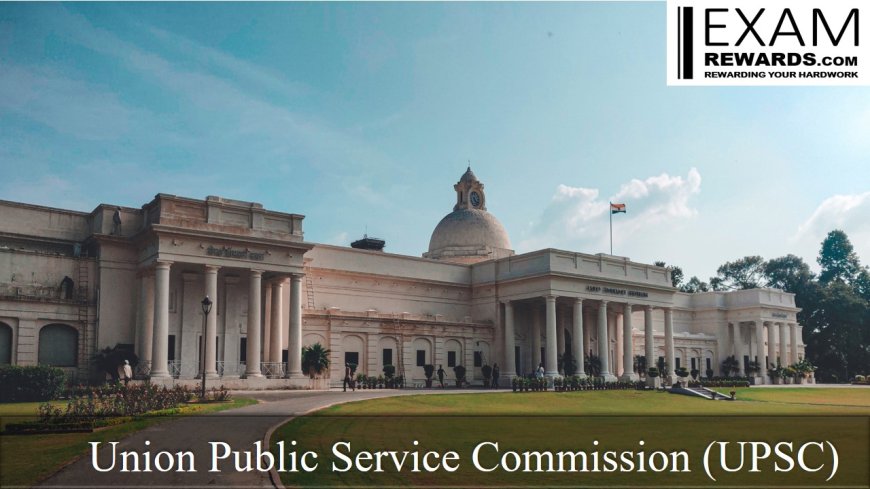Union Public Service Commission (UPSC)
In India's administrative framework, the Union Public Service Commission (UPSC) serves as the gateway to significant government positions, attracting aspiring individuals nationwide. The UPSC journey is a dedicated path that not only shapes careers but also contributes to the country's future. Prospective civil servants embark on a diverse journey that requires commitment, adaptability, and a sound understanding of India's social, political, and economic dynamics. The UPSC exam, comprising three crucial stages - Preliminary, Main, and Interview - presents a formidable challenge that calls for broad knowledge, critical thinking, and ethical sensibility. In this blog, we unravel the UPSC mystery, guiding you through every stage. From building the foundation to facing the final interview, we explore strategies, qualities, and attributes that set successful candidates apart. Whether you're considering the UPSC path or are already on it, join us as we simplify UPSC preparation and uncover the qualities that transform aspirants into accomplished public servants. For more Information read full article by examrewards.com
See Mock Tests Available for this Exam See Notes Available for this Exam See Videos Available for this Exam \\
Union Public Service Commission (UPSC)
TABLE OF CONTENT
1. OVERVIEW
2. ABOUT EXAM
3. MODE OF SELECTION
4. ELIGIBITY
5. HOW TO FILL EXAM FORM
6. SELECTION PROCESS
7. SYLLABUS
8. QUALITIES THAT SET SUCCESSFUL CANDIDATES APART
OVERVIEW-
|
Exam Name |
Union Public Service Commission (UPSC) |
|
Number of vacancies |
Coming soon |
|
Education Qualifications |
Graduate |
|
Age limit |
21- Depends on Category |
|
Registration Date |
February 14, 2024 |
|
Mode of Application |
Online |
|
Mode of Exam |
Offline (pen & paper) |
|
Official Notification PDF |
https://upsc.gov.in/ |
|
Application Link |
Coming soon |
|
Admit card Link |
Coming soon |
|
Result Link |
Coming soon |
About Exam-
In India's administrative framework, the Union Public Service Commission (UPSC) serves as the gateway to significant government positions, attracting aspiring individuals nationwide. The UPSC journey is a dedicated path that not only shapes careers but also contributes to the country's future.
Prospective civil servants embark on a diverse journey that requires commitment, adaptability, and a sound understanding of India's social, political, and economic dynamics. The UPSC exam, comprising three crucial stages - Preliminary, Main, and Interview - presents a formidable challenge that calls for broad knowledge, critical thinking, and ethical sensibility.
In this blog, we unravel the UPSC mystery, guiding you through every stage. From building the foundation to facing the final interview, we explore strategies, qualities, and attributes that set successful candidates apart. Whether you're considering the UPSC path or are already on it, join us as we simplify UPSC preparation and uncover the qualities that transform aspirants into accomplished public servants. For more Information read full article by examrewards.com
MODE OF SELECTION:-
Mode of Selection in UPSC Civil Services Examination
The Union Public Service Commission (UPSC) conducts the Civil Services Examination (CSE) to select candidates for various esteemed roles within the Indian bureaucracy. The selection process for the CSE comprises several stages, each designed to assess different aspects of a candidate's knowledge, skills, and suitability for administrative positions. Here's a detailed look at the mode of selection:
1. Preliminary Examination (Objective Type):
- The first stage of the CSE is the Preliminary Examination, which consists of two papers: General Studies Paper-I and General Studies Paper-II (also known as the Civil Services Aptitude Test or CSAT).
- Both papers are conducted in an objective multiple-choice question format.
- The Preliminary Examination is a screening test to shortlist candidates for the Main Examination. Marks obtained in this stage are not counted towards the final merit list.
2. Main Examination (Written Examination):
- Candidates who qualify the Preliminary Examination move on to the Main Examination.
- The Main Examination consists of nine papers, which include both essay-type and descriptive questions.
- The papers include subjects like Essay, General Studies (four papers), and Optional Subjects (two papers).
- The Main Examination evaluates a candidate's comprehensive understanding, analytical skills, and writing ability.
3. Personality Test (Interview):
- Candidates who perform well in the Main Examination are called for the Personality Test, commonly known as the interview.
- The interview is conducted by a board of experts to assess the candidate's suitability for administrative roles.
- The interview evaluates not only the candidate's knowledge but also their communication skills, attitude, and overall personality.
4. Final Merit List:
- The final merit list is prepared based on the marks obtained by candidates in the Main Examination and the interview.
- The marks of the Preliminary Examination are not counted in the final merit list.
- The final selection is made based on the candidate's performance in the Main Examination and the interview.
It's important to note that the CSE is highly competitive, and candidates need to excel at every stage to secure a coveted position. A well-rounded preparation strategy that encompasses thorough subject knowledge, critical thinking, effective writing skills, and a confidence in the interview is essential for success in the UPSC Civil Services Examination.
ELIGIBILITY
The Union Public Service Commission (UPSC) conducts the Civil Services Examination (CSE) to select candidates for various prestigious positions in the Indian administrative system. To be eligible for the exam, aspirants need to meet specific criteria set by the UPSC. Here's a detailed look at the eligibility requirements:
1. Nationality:
· A candidate must be a citizen of India.
· For certain services like the Indian Administrative Service (IAS) and the Indian Police Service (IPS), candidates from Nepal, Bhutan, Tibetan refugees, and migrants from specific countries are also eligible, as per certain conditions.
2. Age Limit:
· The minimum age to appear for the UPSC CSE is 21 years.
· The maximum age limit varies based on the candidate's category:
· General Category: 32 years
· OBC (Other Backward Classes): 35 years
· SC/ST (Scheduled Castes/Scheduled Tribes): 37 years
· Certain categories like Defense Services Personnel, ex-servicemen, and others have specific age relaxations.
3. Educational Qualification:
· A candidate must hold a degree from a recognized university or institution.
· Candidates who are awaiting their results or are in the final year of their degree course can also apply, but their eligibility is subject to producing proof of passing the degree examination.
4. Number of Attempts:
· The number of attempts a candidate can take at the UPSC CSE depends on their category:
· General Category: 6 attempts
· OBC Category: 9 attempts
· SC/ST Category: Unlimited attempts till the age limit is reached
5. Physical Fitness:
Candidates need to meet certain physical standards to be eligible for certain services like the Indian Police Service (IPS) and the Central Armed Police Forces (CAPF).
6. Additional Criteria:
Some specific services have additional eligibility criteria, like educational qualifications or physical standards. Candidates should carefully review these criteria before applying.
It's crucial for aspiring candidates to thoroughly read and understand the detailed UPSC notification to ensure they meet all the eligibility requirements. Meeting these criteria is the first step towards embarking on the challenging yet rewarding journey of preparing for the UPSC Civil Services Examination.
HOW TO FILL EXAM FORM
Filling out the exam form for the UPSC Civil Services Examination requires careful attention and adherence to the guidelines provided by
the Union Public Service Commission (UPSC). Here's a detailed step-by-step guide to help you through the process:
1. Obtain the Notification:
Start by accessing the official UPSC website (www.upsc.gov.in) to find the latest notification for the Civil Services Examination. This notification will contain all the important details regarding eligibility, exam dates, syllabus, and instructions for filling out the form.
Visit the UPSC Online Application Portal (www.upsconline.nic.in) and click on the link for the Civil Services Examination.
Complete the one-time registration process by providing basic personal information, contact details, and a valid email ID.
Log in with the registered ID and password.
Fill in the required details carefully, including personal information, educational qualifications, choice of examination center, and optional subject (if applicable).
You will need to upload scanned copies of your photograph and signature as per the specifications mentioned in the guidelines.
Ensure that the scanned images are clear and meet the size and format requirements.
You will have the option to select examination centers based on your preferences. Choose centers that are convenient for you.
Pay the required examination fee online using a debit card, credit card, or net banking. Fee exemptions are available for candidates belonging to certain categories.
7. Preview and Submit:
Before final submission, review all the information you have entered to ensure accuracy. Make corrections if needed.
Once you are satisfied, submit the application form. After submission, you won't be able to make changes.
After successful submission, a confirmation page will be generated. Download and print this page for your records. This confirms that your application has been submitted.
Once the application process is complete and the UPSC processes the applications, they will release the admit cards on the official website. Download your admit card using your registration ID and password.
10. Stay Updated:
Remember to read the instructions and guidelines provided by UPSC thoroughly before filling out the form. The application process requires attention to detail and accurate information. Double-check all the details you've entered to ensure they match your official documents. Following these steps will help you complete the application process successfully and ensure you're well-prepared for the upcoming UPSC Civil Services Examination.
SELECTION PROCESS:
1. Notification and Application: The UPSC releases a notification detailing the examination dates, eligibility criteria, syllabus, and application process. Aspiring candidates need to apply online through the UPSC Online Application Portal by filling out the application form, uploading required documents, and paying the examination fee.
2. Preliminary Examination: The Preliminary Examination consists of two papers: General Studies Paper-I and General Studies Paper-II (CSAT).
· It's an objective-type test where candidates mark answers on an OMR sheet.
· Paper-I covers current events, history, geography, polity, economy, and more.
· Paper-II assesses comprehension, logical reasoning, and analytical skills.
3. Main Examination: Candidates who clear the Preliminary Examination are eligible for the Main Examination.
· The Main Examination consists of nine papers, including one qualifying language paper (not included in the final merit) and two optional subject papers.
· The papers cover essay writing, General Studies, and the chosen optional subjects.
· The written answers are descriptive and require comprehensive understanding and critical analysis.
4. Interview (Personality Test): Candidates who perform well in the Main Examination are shortlisted for the interview stage.
· The interview assesses the candidate's personality traits, communication skills, logical reasoning, depth of knowledge, and ethical values.
· A panel of experts asks questions to evaluate the candidate's suitability for administrative roles.
5. Final Merit List and Selection: The final merit list is prepared based on the marks obtained in the Main Examination and the interview.
· The marks of the Preliminary Examination are not considered in the final merit.
· The cumulative marks from the Main Examination and interview determine the rank and selection of candidates.
· Candidates are then allocated services based on their ranks, preferences, and the availability of vacancies.
6. Training and Posting: Selected candidates undergo training at respective training academies like Lal Bahadur Shastri National Academy of Administration (LBSNAA) for IAS officers.
· The training is comprehensive and covers various aspects of administration, governance, and public service.
· After training, candidates are posted to various administrative positions across the country based on their ranks and preferences.
UPSC SYLLABUS
Preliminary Examination:
Paper I: General Studies - I
Current Events:
· National and International importance
· Events from different fields like politics, economy, science, technology, environment, and more.
· Ancient India: Indus Valley Civilization, Vedic Period, Mauryan and Gupta Empires, etc.
· Medieval India: Delhi Sultanate, Mughal Empire, and cultural, social changes.
· Modern India: From the 18th century to the present, colonialism, nationalism, post-independence developments.
· Physical Geography: Earth's structure, landforms, climate, vegetation, etc.
· Economic Geography: Resources, agriculture, industries, trade, etc.
· Social Geography: Population, migration, urbanization, regional development.
· Constitution: Features, amendments, fundamental rights, directive principles, etc.
· Political System: President, Prime Minister, Parliament, State Governments.
· Panchayati Raj, Public Policy, Rights Issues, etc.
· Sustainable development, poverty, inclusion, demographics, social sector initiatives.
· Indian Economy: Planning, sectors, agriculture, industry, services,
etc.
· Physics, Chemistry, Biology: Basic concepts, recent developments, applications.
· Science and Technology: Space, energy, biotechnology, nanotechnology, etc.
Paper II: General Studies - II (CSAT)
Comprehension
· Interpersonal Skills: Communication skills, effective listening, emotional intelligence, etc.
· Logical Reasoning: Deductive, inductive reasoning, analogies, critical reasoning.
· Decision-Making and Problem-Solving: Logical and analytical reasoning for decision-making.
· General Mental Ability: Cognitive abilities, reasoning, numerical ability, data interpretation.
· Basic Numeracy: Class 10 level mathematics, numbers, percentages, ratios, etc.
· Data Interpretation: Charts, graphs, tables, data sufficiency, etc.
Main Examination:
General Studies Paper-I: Indian Heritage and Culture, History, and Geography of the World and Society
1. Indian Heritage and Culture:
· Art and architecture from ancient to modern times.
· Literature, music, dance, theater, and performing arts.
· Religious and philosophical traditions, festivals, cultural practices.
2. Modern Indian History (mid-18th century to present):
· Key events, personalities, social and cultural reforms.
· Freedom Struggle, its stages, contributors, and significant movements.
3. The World History:
· Industrial revolution, world wars, political philosophies, global events.
· Impact of colonization, decolonization, redrawal of national boundaries
4. Indian Society:
· Salient features, diversity, urbanization, poverty, population issues.
· Role of women, social empowerment, communalism, regionalism, and secularism.
5. Geography:
· Physical geography, landforms, climate, vegetation, and their impact.
· Economic geography, resources, agriculture, industries, trade.
· Social geography, population, migration, urbanization, regional development.
General Studies Paper-II: Governance, Constitution, Polity, Social Justice, and International Relations
1. Constitution of India:
· Historical underpinnings, features, amendments, basic structure.
· Role of various organs of the government, separation of powers.
2. Governance and Polity:
· Functions and responsibilities of Union and States, federal structure.
· Parliament, State legislatures, executive, and judiciary.
· Issues related to the federal structure, devolution of powers, challenges.
3. Public Administration and Civil Services:
· Ethics and values, accountability, transparency, e-governance.
· Citizen's charters, quality of service delivery, challenges of corruption.
4. International Relations:
· India's neighborhood relations, bilateral agreements, global groupings.
· India's foreign policy, effects of policies of developed and developing countries.
General Studies Paper-III: Technology, Economic Development, Bio-diversity, Environment, Security, and Disaster Management
1. Economic Development:
· Planning, mobilization of resources, growth, employment.
· Inclusive growth, poverty, agriculture, industry, services.
2. Science and Technology:
· Developments, applications, effects on daily life.
· Achievements of Indians in science and technology.
3. Environment and Ecology:
· Conservation, pollution, climate change, environmental impact.
· Biodiversity, flora, fauna, geophysical phenomena, disasters.
4. Indian Economy:
· Liberalization, reforms, economic growth, inflation, poverty.
· Agriculture, industry, infrastructure, investments.
5. Security and Disaster Management:
· Internal security, external state and non-state actors, cyber security.
· Disaster management, challenges, and mitigation strategies.
General Studies Paper-IV: Ethics, Integrity, and Aptitude
1. Ethics and Human Interface:
· Essence of ethics, human values, lessons from great leaders.
· Role of family, society, and educational institutions in inculcating values.
2. Attitude and Aptitude:
· Attitude, its components, influence on behavior.
· Emotional intelligence, social influence, moral and political attitudes.
3. Contributions of Moral Thinkers:
· Philosophical and ethical teachings of thinkers from India and the world.
4. Public/Civil Service Values and Ethics in Public Administration:
· Role of ethics in public and private relationships, accountability.
· Strengthening ethical and moral values in governance.
5. Probity in Governance:
· Concept of public service, ethics in administration.
· Corruption, accountability, transparency, ethical issues in international relations.
Optional Paper
UPSC Civil Services Mains Examination, candidates have the opportunity to select one optional subject from a list of 48 options. This optional subject consists of two papers, each contributing a total of 250 marks, resulting in a combined total of 500 marks. The selection of the appropriate optional subject requires thoughtful consideration, aligning with the candidate's strengths, interests, and expertise.
Interview (Personality Test):
QUALITIES THAT SET SUCCESSFUL CANDIDATES APART
Steps to Shine:
Building the Basics: Think of this as the foundation phase. Start with the basics of all subjects. Books, online resources, and coaching can help.
Prelims - The First Hurdle: The Preliminary Exam has multiple-choice questions. It's like a filter for the next round. To cross this hurdle, cover lots of topics, practice MCQs, and manage your time well.
Mains - Express Yourself: In the Main Exam, you'll write answers. Imagine explaining things to a friend. Be clear, use examples, and organize your thoughts.
Interview - Your Personality Shines: If you reach the interview stage, it's about showing who you are. Be confident, honest, and thoughtful in your responses.
Qualities That Count:
Change with the Times: Stay updated with what's happening around you – new laws, government decisions, and current events.
Think Smart: UPSC doesn't just want you to memorize; they want you to think critically. Understand issues from different angles.
Be Ethical: UPSC values honesty and a sense of duty. Show that you care about doing the right thing.









